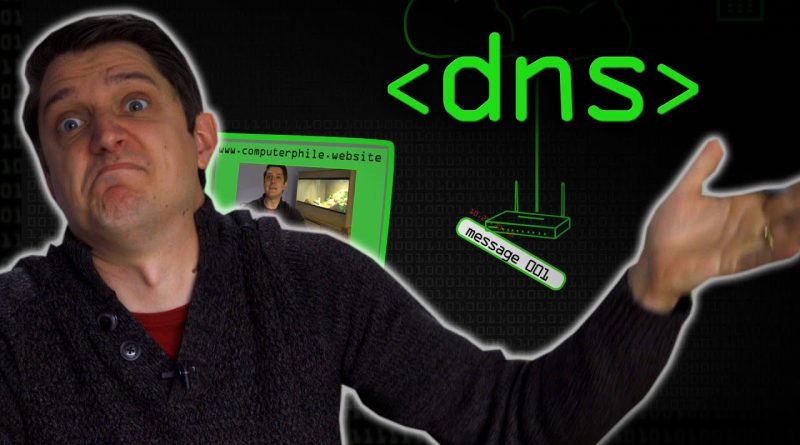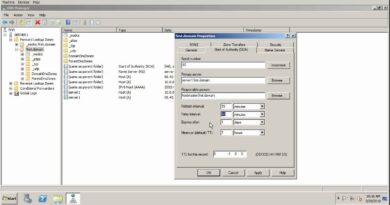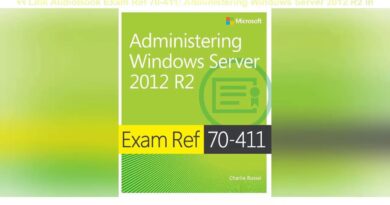How DNS Works – Computerphile
How do websites marry up to their IP addresses? Dr Mike Pound explains the Domain Name System – DNS.
https://www.facebook.com/computerphile
Tweets by computer_phile
This video was filmed and edited by Sean Riley.
Computer Science at the University of Nottingham: https://bit.ly/nottscomputer
Computerphile is a sister project to Brady Haran’s Numberphile. More at http://www.bradyharan.com
by Computerphile
linux dns server




You are not illustrating the recursive method but the iterative method . In recursive approach , the root server will directly ask the TLD server which in turn will ask the Authoritative server and then the response will get back to the client in similar fashion but in reverse order.
Domain Name *Service*, right?
you are simply pulling the matter , you could have explained under 5 minutes but you made me not understand it thank you for you knowledge, no offence
So using query id we may track someones
I really love the idea of the waking up in the morning and going "OH NO is Google where I left it???"
I like seeing pen and paper.
thank you man
soooo mush thanks
I'm not sure I get how, for example, the root dns server get accessed to. For example, it cannot be by its name since it would trigger another DNS lookup. So I assume that some of thoses different kind of servers, if not all, have their IP adresses hardcoded and passed around everywhere. I just don't know and it's not explained.
DNS is the Saul Goodman of the internet.
How about the software that runs the DNS servers? Is it open-source or proprietary?
This Guy is Gifted.. I am Enlightened 💡every time I watch his explanations… Thank you.
Watched this video 2 years ago, didn't get much.
After recent studying, it all makes sense. Great video, this channels is a very helpful reference for top level explanations.
I am wondering why does it gets messy and have to add a query id to correlate request and response? Isn't it synchronous i.e. it waits for the server to return the IP (or suggestion to query another server). Also why would it accept a response from another (say malicious) server with same query id? whom it didn't even query (request)?
2 258 tenth street Mildura Victoria 3500
Kyla jones
Great explanation. One of the few people who explains computer concepts very simply. This is an art. Thank you very much.
Love the fact that at 07:19, the view count for the displayed video is digits of pi
Just set up my website, this stuff is really fun to code for 😀
So name servers are recursive (?) DNS servers. Is that the same name servers configured when registering a domain as well?
This isn't really accurate. First of all, what sort of computer noob uses ping for dns queries?? There's this thing called net-utils that gives you the `dig` command which allows you to look up dns records. Moreover, cache records for a week??? Most people use 24 hours (ttl 86400) but Google in particular uses time to live of 1 hour. When you have a network of many servers serving content over a vast network you probably want to switch servers from time to time (and definitely not just once a week!) to handle load better. Yes, you have a reverse proxy and a load balancer, but with this much traffic you need multiple of those, hence regular updates to dns records and geodns
Can you please come to my university and teach computer networks for the new first semestlers? Damn I needed this channel and especially you back then… Thank you for this video, great work. Enjoying your way of describing things very much. 😉
6:15 So unlucky
Im wondering what creature is behind him in the vivarium
Niklas musst nen Perma Bann bekommen
Niklas hat nen kleinen
Yo Nyrocarion, what's up?
Can you make a video on bonjour / zero config network
Üö
Amazing explanation, thank you!
Thank you computer papi for consantly saving my studies
every once in awhile, i forgot that Computerphile is a double entendre and i get re-excited when i notice it again, lol. computerphile/computer_phile. [brain bMyBrain[] = Mind.Blown();
I like the awkward humor of this man. Would be nice to hang out with this dude for a bit.
Time to live vs time to live … how come it is usually set in minutes? Surely it lives longer than that, or is this a setting that tells it how long it will take at the most to go live?
Ayyyy they kept the </> from bacc
He talks too much
2:15 "if you live at home"
as opposed to ?
The link at the end of Mikes Snake cannot be clicked on. Is there a link to that?
2:05 it could also be in /etc/hosts if you use linux right?
Wont it be possible to setup your own domains then by sending a new ip and domain to one of the servers?
Is it the for this YouTube video I’m watching